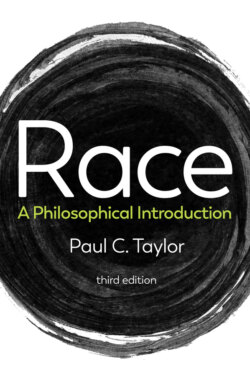Читать книгу Race - Paul C. Taylor - Страница 6
Acknowledgments
ОглавлениеA great many people and institutions have made this book possible. I’ll appeal in advance for the forgiveness of the ones I will inevitably forget to mention.
I developed the perspective worked out in the first edition of this book while teaching social philosophy and race theory courses at Le Moyne College, the University of Kentucky, and the University of Washington in Seattle. Accordingly, I owe a great deal to students at all three schools, and especially to Jennifer Pettit, Noah Purcell, Jasmin Weaver, and Stephanie McNees. Linda Martín Alcoff and Charles Mills gave helpful comments on the original manuscript, and equally helpful encouragement and feedback as I turned the original edition into its successors.
While working on the second edition, I had the great privilege of discussing the book with Myisha Cherry, Chike Jeffers, Desiree Melton, and Quayshawn Spencer at an author-meets-critics APA session. Their constructive criticisms were immensely helpful. In addition, two anonymous reviewers offered insightful suggestions on the manuscript, as did Professor Jeffers and Robert Gooding-Williams.
The third edition benefited greatly from the invaluable research assistance of Vanderbilt graduate student Eric Okamoto Akira MacPhail. I also had the opportunity to hear directly from undergraduate students who were working through the book in Eddie Glaude’s African American Studies and Race course at Princeton and in Professor Jeffers’ Philosophy of Race course at Dalhousie. Both groups – and their generous professors, and their professors’ colleagues, especially the brilliant Imani Perry – have my undying gratitude.
Many people guided and pushed me in conversation, including Nikhil Singh, Alys Weinbaum, and the other participants in the University of Washington colloquia on “Black Identity in Theory and Practice”; the participants in the Social Theory Committee’s “Whiteness” symposium at Kentucky; the Affrilachian Poets, especially Kelly Ellis and Nikky Finney; and various other individuals, including Michele Birnbaum, Susan Bordo, Howard McGary, Ron Mallon, Michael Root, Ann Ryan, Sally Haslanger, Lewis Gordon, Ron Sundstrom, and Anne Eaton. Cornel West, Nikky Finney, and Amy Hempel, in different ways and at different times, rekindled my passion for communicating hard thoughts in interesting and accessible ways – or, at least, for trying to live up to their remarkable standards for this kind of work.
The editorial staff at Polity has at every turn been more supportive and patient than I could have expected. Jean van Altena’s careful copy-editing on the first edition helped me in many cases to say what I really meant, or should have meant, and set the stage for much that worked through the subsequent editions. Pascal Porcheron, Ellen MacDonald-Kramer, and Stephanie Homer have been incredibly understanding and supportive through the interminable delays in bringing this project to fruition.
Finally, I should mention a few people to whom I owe special debts. Ken Clatterbaugh, my ever-supportive department chair at Washington, was the first person to suggest that there was a useful project here, and then brokered my introduction to the editorial team at Polity. This book truly would not exist without him. My sister, Mona Phillips, keeps reminding me what it means to take thinking seriously. Eddie Glaude and Falguni Sheth have heard and seen and encouraged my thinking on race more than anyone else. Anika Simpson has, more than anyone else, helped me cope with the peculiar contradictions of thinking these thoughts as a philosopher. And, finally, my wife and children, Wilna Julmiste Taylor, John Taylor, and Julia Taylor, have been tremendously patient as I have neglected them to stare at pages and screens and peck at keys. They have been more supportive and loving than I could reasonably have hoped.
